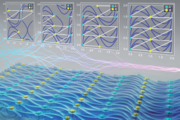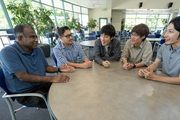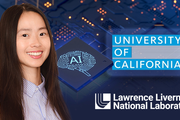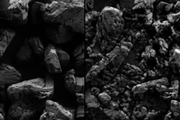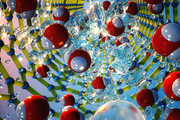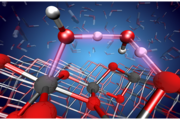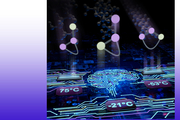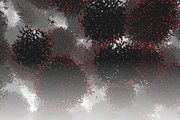Did you know we have a monthly newsletter? View past volumes and subscribe.
Welcome new DSI team members
April 2, 2024 -
When Data Science Institute (DSI) director Brian Giera and deputy director Cindy Gonzales began planning activities for fiscal year 2024 and beyond, they immediately realized that LLNL’s growth in data science and artificial intelligence (AI)/machine learning (ML) research requires corresponding growth in the DSI’s efforts. “Our field is booming,” Giera states. “The Lab has a stake in the...
Will it bend? Reinforcement learning optimizes metamaterials
Dec. 13, 2023 -
Lawrence Livermore staff scientist Xiaoxing Xia collaborated with the Technical University of Denmark to integrate machine learning (ML) and 3D printing techniques. The effort naturally follows Xia’s PhD work in materials science at the California Institute of Technology, where he investigated electrochemically reconfigurable structures. In a paper published in the Journal of Materials...
Data Days brings DOE labs together for discussions on data management and more
Nov. 9, 2023 -
Data researchers, developers, data managers, and program managers from the DOE national laboratories visited LLNL on October 24–26 to discuss the latest in data management, sharing, and accessibility at the 2023 DOE Data Days (D3) workshop. Sponsored by the National Nuclear Security Administration’s (NNSA) Office of Defense Nuclear Nonproliferation and hosted annually by LLNL, the event...
Data Science Summer Institute hosts student interns from Japan
Oct. 13, 2023 -
The Data Science Summer Institute (DSSI) hosted summer student interns from Japan on-site for the first time, where the students worked with Lab mentors on real-world projects in AI-assisted bio-surveillance and automated 3D printing. From June to September, the three students—Raiki Yoshimura, Shinnosuke Sawano and Taisei Saida—lived in rental apartments near the Lab and worked at the Lab on...
LLNL, University of California partner for AI-driven additive manufacturing research
Sept. 27, 2023 -
Grace Gu, a faculty member in mechanical engineering at UC Berkeley, has been selected as the inaugural recipient of the LLNL Early Career UC Faculty Initiative. The initiative is a joint endeavor between LLNL’s Strategic Deterrence Principal Directorate and UC national laboratories at the University of California Office of the President, seeking to foster long-term academic partnerships and...
Explainable artificial intelligence can enhance scientific workflows
July 25, 2023 -
As ML and AI tools become more widespread, a team of researchers in LLNL’s Computing and Physical and Life Sciences directorates are trying to provide a reasonable starting place for scientists who want to apply ML/AI, but don’t have the appropriate background. The team’s work grew out of a Laboratory Directed Research and Development project on feedstock materials optimization, which led to...
Machine learning reveals refreshing understanding of confined water
July 24, 2023 -
LLNL scientists combined large-scale molecular dynamics simulations with machine learning interatomic potentials derived from first-principles calculations to examine the hydrogen bonding of water confined in carbon nanotubes (CNTs). They found that the narrower the diameter of the CNT, the more the water structure is affected in a highly complex and nonlinear fashion. The research appears on...
Celebrating the DSI’s first five years
May 18, 2023 -
View the LLNL Flickr album Data Science Institute Turns Five.
Data science—a field combining technical disciplines such as computer science, statistics, mathematics, software development, domain science, and more—has become a crucial part of how LLNL carries out its mission. Since the DSI’s founding in 2018, the Lab has seen tremendous growth in its data science community and has invested...
Fueling up hydrogen production
April 3, 2023 -
Through machine learning, an LLNL scientist has a better grasp of understanding materials used to produce hydrogen fuel. The interaction of water with TiO2 (titanium oxide) surfaces is especially important in various scientific fields and applications, from photocatalysis for hydrogen production to photooxidation of organic pollutants to self-cleaning surfaces and biomedical devices. However...
From plasma to digital twins
March 13, 2023 -
LLNL's Nondestructive Evaluation (NDE) group has an array of techniques at its disposal for inspecting objects’ interiors without disturbing them: computed tomography, optical laser interferometry, and ultrasound, for example, can be used alone or in combination to gauge whether a component’s physical and material properties fall within allowed tolerances. In one project, the team of NDE...
New HPC4EI project to create 'digital twin' models for aerospace manufacturing
Jan. 19, 2023 -
A partnership involving LLNL aimed at developing “digital twins” for producing aerospace components is one of six new projects funded under the HPC for Energy Innovation (HPC4EI) initiative, the Department of Energy’s Office of Energy Efficiency and Renewable Energy announced. Sponsored by the HPC4Manufacturing (HPC4Mfg) Program, one of the pillars of HPC4EI, the collaboration between LLNL...
ML model instantly predicts polymer properties
Nov. 30, 2022 -
Hundreds of millions of tons of polymer materials are produced globally for use in a vast and ever-growing application space with new material demands such as green chemistry polymers, consumer packaging, adhesives, automotive components, fabrics and solar cells. But discovering suitable polymer materials for use in these applications lies in accurately predicting the properties that a...
ESGF launches effort to upgrade climate projection data system
Oct. 5, 2022 -
The Earth System Grid Federation (ESGF), a multi-agency initiative that gathers and distributes data for top-tier projections of the Earth’s climate, is preparing a series of upgrades that will make using the data easier and faster while improving how the information is curated. The federation, led by the Department of Energy’s Oak Ridge National Laboratory in collaboration with Argonne and...
LLNL to cooperate with University of Utah's one oneAPI Center of Excellence
Sept. 21, 2022 -
The University of Utah has announced the creation of a new oneAPI Center of Excellence focused on developing portable, scalable and performant data compression techniques. The oneAPI Center will be headed out of the University of Utah’s Center for Extreme Data Management Analysis and Visualization (CEDMAV) and will involve the cooperation of LLNL’s Center for Applied Scientific Computing. It...
An open-source, data-science toolkit for energy: GridDS
Aug. 2, 2022 -
As the number of smart meters and the demand for energy is expected to increase by 50% by 2050, so will the amount of data those smart meters produce. While energy standards have enabled large-scale data collection and storage, maximizing this data to mitigate costs and consumer demand has been an ongoing focus of energy research. An LLNL team has developed GridDS—an open-source, data-science...
Paving the way to tailor-made carbon nanomaterials and more accurate energetic materials modeling
March 17, 2022 -
To better understand how carbon nanomaterials could be tailor-made and how their formation impacts shock phenomena such as detonation, LLNL scientists conducted machine-learning-driven atomistic simulations to provide insight into the fundamental processes controlling the formation of nanocarbon materials, which could serve as a design tool, help guide experimental efforts and enable more...
Understanding materials behavior with data science (VIDEO)
Dec. 21, 2021 -
Computational chemist Rebecca Lindsey, PhD, explains how machine learning and data science techniques are used to develop diagnostic tools for stockpile stewardship, such as models that predict detonator performance. Lindsey also describes how atomistic simulations improve researchers’ understanding of the microscopic phenomena that govern the chemistry in materials under extreme conditions...
Building better materials with data science (VIDEO)
Nov. 11, 2021 -
Research engineer Brian Giera, PhD, describes how data science techniques help collect and analyze data from advanced manufacturing processes in order to craft meaningful experiments. With examples of automated microencapsulation, 3D nanoprinting, metal additive manufacturing, laser track welding, and digital twins, Giera explains how interdisciplinary teams apply machine learning to remove...
Building confidence in materials modeling using statistics
Oct. 31, 2021 -
LLNL statisticians, computational modelers, and materials scientists have been developing a statistical framework for researchers to better assess the relationship between model uncertainties and experimental data. The Livermore-developed statistical framework is intended to assess sources of uncertainty in strength model input, recommend new experiments to reduce those sources of uncertainty...
Inaugural industry forum inspires ML community
Sept. 16, 2021 -
LLNL held its first-ever Machine Learning for Industry Forum (ML4I) on August 10–12. Co-hosted by the Lab’s High-Performance Computing Innovation Center (HPCIC) and Data Science Institute (DSI), the virtual event brought together more than 500 enrollees from the Department of Energy (DOE) complex, commercial companies, professional societies, and academia. Industry sponsors included...


